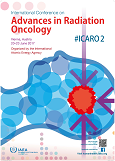Speaker
Keith R. BRITTON
(CIRRO)
Description
ABSTRACT
PURPOSE: To report the initial experience, preliminary results and learning curve of a single-center using Iridium-192 High-Dose-Rate (HDR) brachytherapy alone or combined with external beam radiotherapy (EBRT) in patients with organ-confined (T1-T2) prostate cancer.
MATERIALS AND METHODS: We performed interstitial implants on fifteen consecutive prostate cancer patients (T1:T2 = 1:14) with the use of Iridium-192 from June 2014 to November 2016 at CIRRO center. Dose assignment to the prostate by treatment groups were: 38 Gy (4 fractions) for monotherapy patients, 11.5 Gy (2 fractions) for salvage patients and 9 Gy (1 fraction) for combination with EBRT (30 fraction). Two patients (13.3%) were treated with salvage intention, four patients (26.6%) received hormone therapy and six patients (40%) received EBRT. Ultrasound-guided interstitial implants were performed on real-time followed by dose optimization processes. Prostatic Specific Antigen (PSA) levels were acquired at 1 month after the procedure and every 3 months thereafter. The Radiation Therapy Oncology Group (RTOG) radiation morbidity scoring criteria was utilized to assess acute toxicity. Evaluation of learning curve included patient stratification into 3 groups: Case 1 to 5 (Group 1), case 6 to 10 (group 2) and case 11 to 15 (group 3).
RESULTS: Patients have been followed for a mean period of 17 months (range: 1-30). HDR brachytherapy alone (radical/salvage) or combined with EBRT was well tolerated. No significant intra- or peri-operative complications occurred. No patient experienced acute toxicity of grade 3 or more. Overall, total study follow-up clinical and biochemical relapse-free rates were 100%. For patients who received HDR Brachytherapy as monotherapy without hormone therapy (40%), PSA levels normalized in 100% of patients within an mean time of 5 months (range: 1-6) after irradiation. Operative time reduced along time (min.) in all groups (Median + SD): Group 1 (237+64), group 2 (244+46) and group 3 (199+55).
CONCLUSIONS: Brachytherapy with Iridium-192 is a feasible and an effective alternative for early stage prostate cancer with good early biochemical disease control rates. In this study, favorable toxicity profiles were observed. As monotherapy (and without hormone therapy), encouraging preliminary outcomes data were seen. As the reference center in the country, efforts for further accrual and longer follow-up is warranted and will allow comparison to other techniques.
| Institution | Department of Radiation Oncology, Centro Internacional de Radiocirugía y Radioterapia Oncologica (C.I.R.R.O.), Panama |
|---|---|
| Country | PANAMA |
Author
Keith R. BRITTON
(CIRRO)
Co-authors
Jackson LIO
(ION)
Ricardo BRITTON
(CIRRO)
Victor FISHER
(CIRRO)
Yarisa VILLAREAL
(CIRRO)

